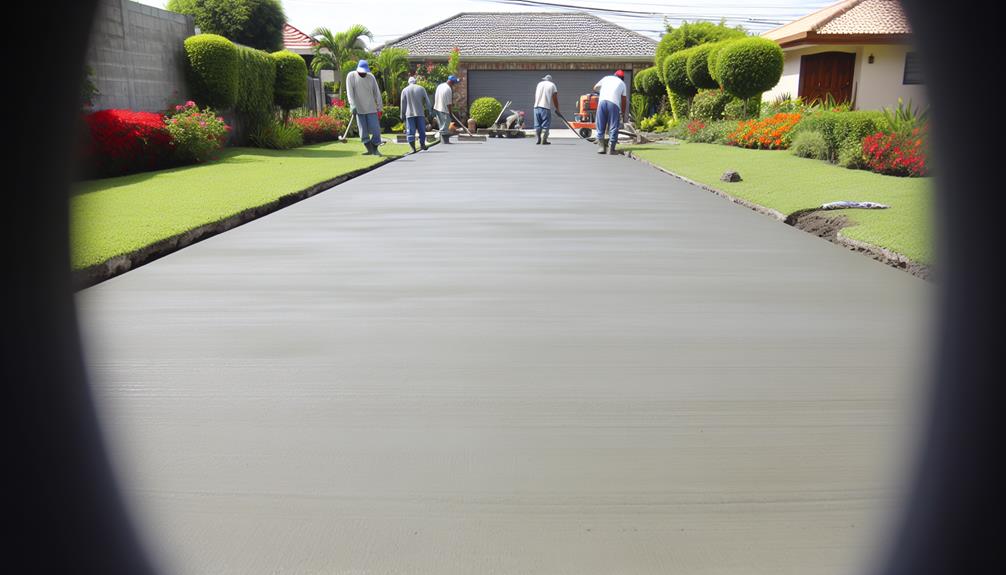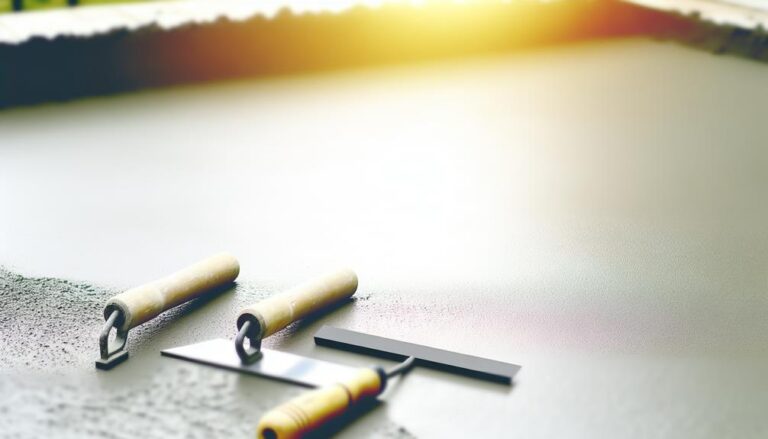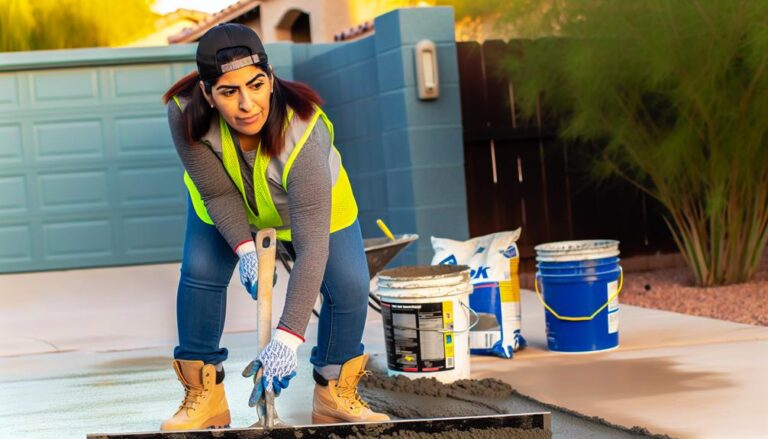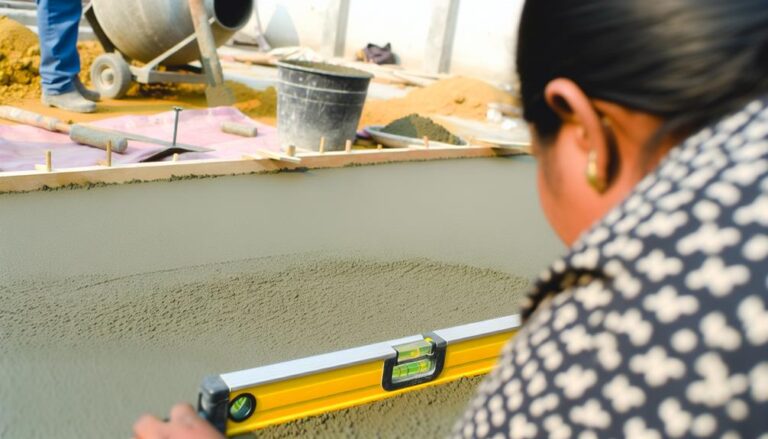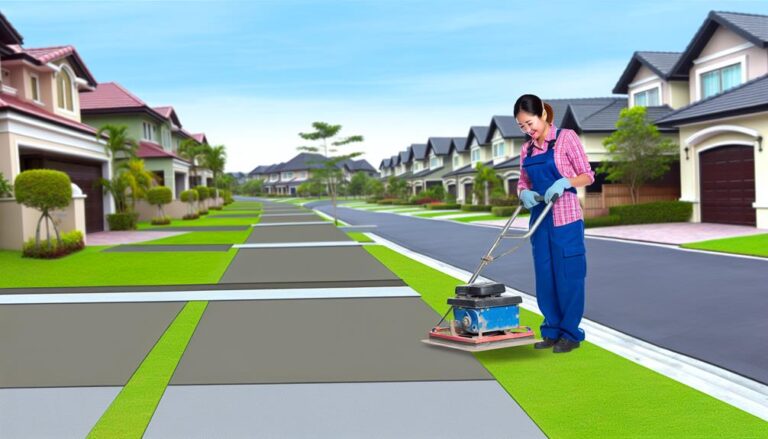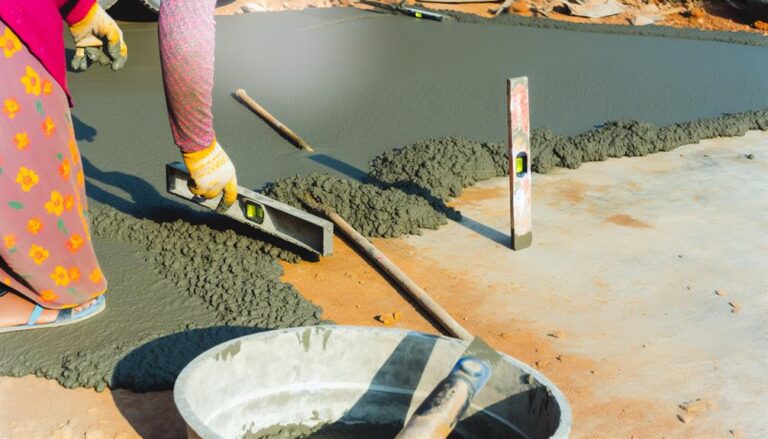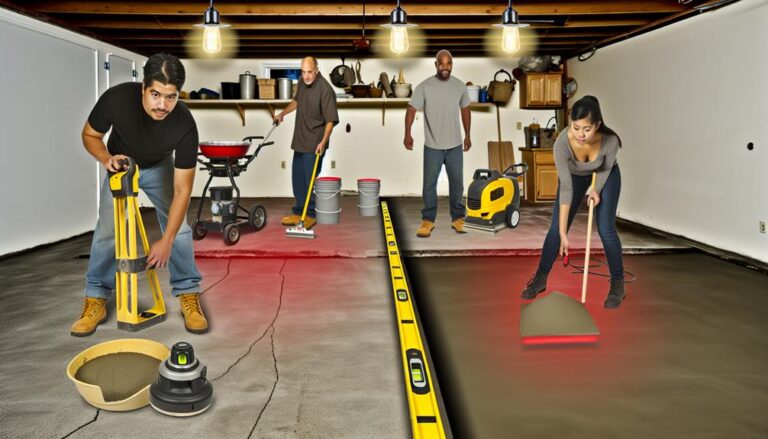Affordable Concrete Leveling Services in Your Area
Finding affordable concrete leveling services in your area can save you time and money while enhancing your property's safety and aesthetics. Look for professionals offering methods like mudjacking or polyurethane foam injection. These options are cost-effective and usually take just a few hours. To find reliable contractors, ask friends, family, or neighbors for recommendations, and check online reviews. Consider long-term value and potential future savings when comparing DIY to professional services. If you're curious about choosing the best method and finding trusted professionals nearby, stick around for more tips and insights.
Understanding Concrete Leveling
Concrete leveling is the process of correcting uneven concrete surfaces by injecting a specialized material underneath. When you notice your driveway, patio, or walkway is uneven, it's time to explore this effective solution. Instead of tearing out and replacing the entire slab, concrete leveling targets the root of the problem.
First, small holes are drilled into the affected areas of the concrete. Then, a high-density polyurethane foam or a cement-based slurry is injected through these holes. This material fills any voids beneath the concrete and raises the slab back to its original, even position. The process is precise, ensuring that your surfaces are level and safe again.
You'll find that concrete leveling is suitable for a variety of surfaces, whether they're residential or commercial. It's a versatile solution that can address issues like sunken sidewalks, uneven driveways, and lopsided patios. Since the materials used are designed to be durable, they offer a long-term fix to your problems.
Understanding the basics of concrete leveling will help you make an informed decision when faced with uneven surfaces. By opting for this method, you can restore the appearance and functionality of your concrete areas without the need for extensive replacements.
Benefits of Concrete Leveling
Opting for concrete leveling offers numerous benefits that make it a practical and cost-effective solution for addressing uneven surfaces. First and foremost, it's a budget-friendly alternative to completely replacing concrete slabs. You save money by preserving your existing concrete rather than investing in new materials and labor.
Another significant advantage is the time efficiency. Concrete leveling can often be completed in just a few hours, minimizing disruption to your daily routine. There's no need to wait days for new concrete to cure; you can resume using the leveled surface almost immediately.
Safety is another essential benefit. Uneven surfaces can be hazardous, leading to trips and falls. By leveling the concrete, you eliminate these risks, creating a safer environment for everyone. This is especially important for areas with high foot traffic, such as walkways and driveways.
Concrete leveling also enhances the aesthetic appeal of your property. Smooth, even surfaces look more attractive and can boost your property's value. Additionally, it's an eco-friendly option since you're reusing existing materials rather than generating waste.
Self-Leveling Compound
When it comes to achieving a perfectly level surface, a self-leveling compound can be your best ally. This specialized mixture is designed to flow and spread easily, filling in low spots and creating a smooth, even finish on your concrete floors.
Whether you're dealing with minor dips or more substantial unevenness, using a self-leveling compound simplifies the process.
First, you'll need to prepare the area by thoroughly cleaning the surface and ensuring it's free of debris. Mix the self-leveling compound according to the manufacturer's instructions, and then pour it onto the floor. The compound will naturally seek out low areas and level itself out without much effort on your part.
You can use a spreading tool to help guide it, but the compound does most of the work for you.
One of the biggest advantages of using a self-leveling compound is its quick drying time. You'll find that it sets in just a few hours, allowing you to proceed with your flooring project without lengthy delays.
Plus, it's versatile enough to work with various types of flooring, including tiles, carpets, and hardwood. Choose a self-leveling compound to make your concrete leveling task easier and more efficient.
Mudjacking Explained
While self-leveling compounds offer a quick fix for surface imperfections, mudjacking is a reliable method for addressing more significant concrete settling issues. This technique involves drilling small holes into the existing concrete slab and pumping a mixture of water, soil, and cement underneath. As the mixture is injected, it fills voids and raises the slab back to its original level. Mudjacking is particularly effective for areas like driveways, sidewalks, and patios where concrete has sunken over time.
Mudjacking offers several advantages over other methods. Here's a comparison to help you understand:
| Feature | Mudjacking |
|---|---|
| Cost | Generally lower than other methods |
| Durability | Long-lasting with proper care |
| Time to Complete | Usually a few hours |
| Disruption to Area | Minimal |
| Environmental Impact | Uses natural materials |
Mudjacking is not only cost-effective but also durable, often lasting for many years if the underlying soil conditions remain stable. The process is relatively quick, often taking just a few hours, and causes minimal disruption to your daily life. Additionally, because it uses natural materials, it's an environmentally friendly option. If you're dealing with uneven concrete, mudjacking could be the perfect solution to restore your surfaces.
Polyurethane Foam Injection
Polyurethane foam injection, a modern alternative to traditional mudjacking, involves injecting a high-density foam beneath the concrete slab to lift and stabilize it. This method has gained popularity due to its precision and efficiency.
When you choose polyurethane foam injection, small holes are drilled into the affected concrete. Then, a specialized foam is injected through these holes. The foam expands, filling voids and lifting the slab back to its original position within minutes.
One of the significant advantages of polyurethane foam injection is its minimal disruption. You won't have to worry about the mess often associated with other methods. The process is quick, and you can typically use the area again in just a few hours. Plus, the high-density foam is resistant to water and erosion, ensuring a long-lasting solution.
Another benefit is its lightweight nature, which means your existing soil won't be further compacted or stressed. This method is versatile and can be used for various applications, including driveways, sidewalks, and even interior floors.
Choosing the Right Method
How do you decide which concrete leveling method is best for your specific needs? It starts with understanding the different methods available and the specific characteristics of your project.
If you're dealing with minor unevenness, mudjacking might be a cost-effective solution. This method involves pumping a slurry mixture beneath the slab to lift it back into place. It's ideal for heavier concrete surfaces like driveways and sidewalks.
On the other hand, if precision and minimal disruption are your priorities, polyurethane foam injection could be the way to go. This method uses a lightweight, expanding foam that fills voids and stabilizes the slab. It's perfect for areas requiring quick turnaround times and minimal mess.
Next, consider the condition of the soil beneath your concrete. If the soil is highly compressible or prone to shifting, polyurethane foam offers better long-term stability. Mudjacking mightn't provide the same durability in such conditions.
Lastly, think about your budget. Mudjacking generally costs less upfront, but polyurethane foam may offer better value over time due to its longevity and effectiveness. By weighing these factors, you'll make an informed decision tailored to your specific concrete leveling needs.
DIY Concrete Leveling
Tackling concrete leveling on your own can be a rewarding and cost-effective project if you have the right tools and knowledge. First, you need to identify the type of uneven surface you're dealing with. Once you've assessed the area, gather the necessary tools: a concrete mix, a trowel, a level, and a concrete grinder. Next, clean the area thoroughly to guarantee proper adhesion. Mix the concrete according to the manufacturer's instructions and apply it to the low areas, smoothing it out with a trowel.
Here's a quick reference table for the tools and materials you'll need:
| Tool/Material | Purpose | Notes |
|---|---|---|
| Concrete Mix | Filling and leveling | Choose according to project |
| Trowel | Smoothing and spreading concrete | Opt for a sturdy one |
| Level | Checking even surfaces | A laser level is effective |
| Concrete Grinder | Smoothing uneven surfaces | Useful for large areas |
After applying the concrete, use the level to check your work. Adjust as necessary before the concrete sets. Remember, patience is key. Allow the concrete to cure properly to prevent future issues. By taking the time to do it right, you'll save money and gain the satisfaction of a job well done.
Cost Considerations
After successfully leveling your concrete, it's important to take into account the costs associated with both DIY and professional services. When you opt for a DIY approach, you'll save on labor but need to purchase or rent the necessary equipment. Expect to spend on materials like concrete mix, sealant, and tools. While initial costs might seem low, unforeseen expenses such as additional materials or equipment repairs can add up.
In contrast, hiring a professional service typically involves a higher upfront cost but offers the benefit of expertise and efficiency. Professionals come equipped with specialized tools and materials, which are factored into the overall price. They also save you time and eliminate the risk of making costly errors. However, it's pivotal to request detailed estimates and understand what's included in the service package to avoid unexpected charges.
Additionally, consider the long-term value. Professionally leveled concrete often lasts longer, potentially saving you money on future repairs. On the other hand, a DIY job might require more frequent maintenance.
Evaluating these cost considerations helps you make an informed decision that aligns with your budget and needs.
Finding Local Professionals
Finding the right local professionals for your concrete leveling project starts with thorough research and gathering recommendations from trusted sources. Begin by asking friends, family, and neighbors if they've used concrete leveling services recently. Their firsthand experiences can provide valuable insights into the reliability and quality of local contractors.
Next, take advantage of online resources. Websites like Yelp, Google Reviews, and Angie's List offer reviews and ratings from previous customers. Pay close attention to both positive and negative feedback to get a balanced view of each contractor's performance. Look for professionals with consistently high ratings and detailed reviews that highlight their expertise and customer service.
Don't forget to check each contractor's credentials. Make sure they're licensed, insured, and experienced in concrete leveling. You can verify their licensing status through your state's licensing board or online databases. Insurance is essential as it protects you in case of any accidents or damages during the project.
Frequently Asked Questions
How Long Does Concrete Leveling Usually Take to Complete?
Concrete leveling usually takes just a few hours to complete, depending on the size of the area and the amount of leveling required.
You'll find that smaller jobs can be done in under an hour, while larger or more complex projects might take a bit longer.
Once the leveling is done, you can typically use the area almost immediately, making it a quick and efficient process.
What Is the Expected Lifespan of Repaired Concrete Surfaces?
You might be wondering about the durability of your repaired concrete surfaces.
Well, here's the exciting part: with proper maintenance, these surfaces can last a remarkable 10 to 20 years!
Imagine not having to worry about cracks or unevenness for that long.
It all depends on the quality of the repair and environmental factors, but you can certainly expect a long-lasting, sturdy surface if done right.
Are There Any Environmental Impacts Associated With Concrete Leveling?
When you consider concrete leveling, it's essential to mention the environmental impacts. Concrete leveling typically uses fewer materials than complete replacement, which reduces waste.
However, some leveling compounds contain chemicals that could be harmful if not managed properly. It's vital to choose eco-friendly materials and professionals who follow best practices. By doing so, you minimize the environmental footprint of the repair process.
Can Concrete Leveling Be Performed in Cold Weather Conditions?
When frost nips at your nose, you might wonder if concrete leveling can still be done. Imagine a craftsman weaving through winter's chill; yes, it's possible.
Concrete leveling can be performed in cold weather conditions, but you've got to follow specific procedures to guarantee success. The key is to keep the materials warm and protect the curing process from freezing.
How Soon Can the Leveled Area Be Used After the Service?
After the concrete leveling service, you can usually use the leveled area within 24 to 48 hours. The exact time can vary based on the specific materials and methods used. Always follow the contractor's advice for the best results.
It's important to allow proper curing to guarantee the longevity and stability of the repair. So, plan accordingly to avoid any disruptions in your daily activities.
